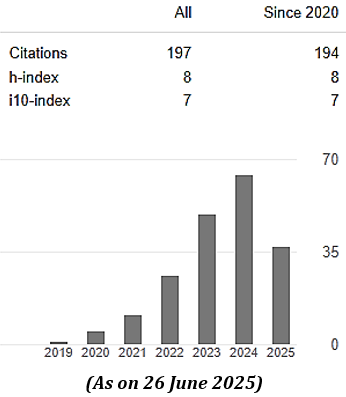SUSTAINABLE FINANCE FOR GROWTH AND DEVELOPMENT OF BANKING INDUSTRY IN BANGLADESH: AN EQUITY PERSPECTIVE
Abstract
The present study is about sustainable finance- a prerequisite for growth and development of banking industry in
Bangladesh. The study is based on a total number of 20 commercial banks and total 120 respondents consisting the
bank owners. This study is an outcome of both the primary and secondary data. The requisite primary data were
collected using structured questionnaire. The main objective of this study is to critically evaluate the role of sustainable
finance in the growth and development in the banking industry in Bangladesh. This study reveals that the levels of
perceptions of the most of the respondents were found to be very high in terms of their awareness, beliefs, attitudes
and understanding as regards the dimensions of sustainable finance viz. customers’ satisfaction, employees’ welfare,
contribution to govt. exchequer, generating revenues, cost savings, products or services with rescannable charge,
brand awareness and addition to capital and the shareholders’ equity representing value of the firm was found to be
influenced to the extent of 41.6 percent by the relevant independent variables representing sustainable finance of
the sample banks. The major suggestions for addressing challenges put forward by the respondents have been loan
sanctioning founding on proper appraisal of loan applications and improving operational efficiency. The relevant bank
authorities should implement the suggestions in order to improve the sustainable finance related factors.
Downloads
References
sustainability of selected microfinance institutions in Namibia (No.
39). Namibian Economic Policy Research Unit.
[2] Anwarul Islam, K. M., and Zaman, M. (2013). An Empirical Study
on Effect of Productivity on Profitability in Some Selected Private
Commercial Banks (PCBs) in Bangladesh. International Journal of
Economics and Finance, 5(12), 151-162.
[3] Eke, O. P., and Olokoyo, F. O. (2017). Global Financial Crisis and
its Ramifications on Capital Markets, Contributions to Economics.
[4] Khaleq et al. (1995) Research Procedure in Social Science, Hasan
Book House, Dhaka, P-205
[5] Kinde, B. A. (2012). Financial sustainability of microfinance
institutions (MFIs) in Ethiopia. European Journal of Business and
Management, 4(15), 1-11.
[6] León, Patricia. 2001. Four Pillars of Financial Sustainability.
Resources for Success Series. Volume 2. Arlington, VA, USA: The
Nature Conservancy.
[7] Peloza, J., and Yachnin, R. (2008). Valuing business sustainability:
A systematic review. Research Network for Business Sustainability
Knowledge Project Series.
[8] Rahman, A. (1996). Micro-credit initiatives for equitable and
sustainable development: who pays? A case study of the Grameen
Bank Program in rural Bangladesh.
[9] Rai, A. K., and Rai, S. (2012). Factors affecting financial
sustainability of microfinance institutions. Journal of Economics and
Sustainable Development, 3(6), 1-9.
[10] Solaiman and Azad (2009), Sustainable Development in
Bangladesh Perspective, The Cost and Management, Journal of
ICMAB, P-25
[11] Soppe, A. (2004). Sustainable corporate finance. Journal of
Business Ethics, 53(1-2), 213-224.
[12] Sultana, N. and Akter, A. (2015) “Factors influencing the
sustainability of private commercial banks in Bangladesh”,
proceedings of the13th SAMF international conference in Colombo,
Srilanka, 2015, AMDISA & ICPM, Srilanka, pp. 170-179.
[13] Sustainability (2002) /IFC/Ethos, Developing Value. The business
case for sustainability in emerging markets, p. 4, http://www.sustainability.
com/library/developing-value; similarly based on case studies,
[14] Vijfvinkel, S., Bouman, N., and Hessels, J. (2011). Environmental
sustainability and financial performance of SMEs. EIM Research
Reports.
MIJST follows the open access policy.

This work is licensed under a Creative Commons Attribution-NonCommercial 4.0 International License. This allows anyone to copy, share, distribute, and modify the work for non-commercial purposes, where the original work and source should be properly credited.















